In our last episode of the season, we take one one of the most requested futures: telepathy! What would it be like to be able to link minds, and communicate brain to brain? And how likely is it that we’ll ever get this kind of technology?
We start the episode by talking to Roger Luckhurst, a Professor in Modern and Contemporary Literature at Birkbeck, University of London, who explains where the word telepathy comes from, and how it totally obsessed men of science in the early 1800’s. Then, futurist and science fiction author Ramez Naam walks us through both the current state of science and the futuristic world of his science fiction series Nexus, that centers around a drug that gives people telepathic powers. After that, we consider what a future full of telepathic people might mean for etiquette with Robin Abrahams, the etiquette columnist for the Boston Globe. And then we talk privacy and digital security with Kit Walsh, a a staff attorney at the Electronic Frontier Foundation. And we finish out the episode by talking to Lateef McLeod, a poet, blogger, activist and doctoral student in the anthropology and social change program at California Institute for Integral Studies, about how those with complex communication needs might appreciate a new form of communication.
Further reading: Science & history
- The Neurologist Who Hacked His Brain — And Almost Lost His Mind
- When “I” becomes “We”: ethical implications of emerging brain-to-brain interfacing technologies
- Conscious Brain-to-Brain Communication in Humans Using Non-Invasive Technologies
- Brain-to-Brain Interfaces: When Reality Meets Science Fiction
- The invention of telepathy, 1870-1901 by Roger Luckhurst
- Telepathy and literature: essays on the reading mind by Nicholas Royle
- “First Report of the Literary Committee by W.F. Barrett, C.C. Massey, Rev. W. Stainton Moses, Frank Podmore…. In Proceedings of the Society for Psychical Research”
- Phenomena: the secret history of the U.S. government’s investigations into extrasensory perception and psychokinesis by Annie Jacobsen
- The 120-Year-Old Mind-Reading Machine
- The Future of Human Evolution | Ray Kurzweil Q & A | Singularity University
- Science Gave My Son the Gift of Sound
- Understanding Deafness: Not Everyone Wants to Be ‘Fixed’
- Memory Implant Gives Rats Sharper Recollection
- Building the Bionic Brain
- A cortical neural prosthesis for restoring and enhancing memory
- Computing Arm Movements with a Monkey Brainet
- A Brain-to-Brain Interface for Real-Time Sharing of Sensorimotor Information
- The Ultimate Interface: Your Brain
- Reconstructing visual experiences from brain activity evoked by natural movies
- Facilitation and restoration of cognitive function in primate prefrontal cortex by a neuroprosthesis that utilizes minicolumn-specific neural firing
- Protect Your Right to Repair and Control the Devices in Your Life
- Defend Your Right to Repair!
Further reading: Science fiction
- Crosstalk by Connie Willis
- Nexus trilogy by Ramez Naam
- “Mute,” Twilight Zone episode
- “To Serve Man,” Twilight Zone episode
- Childhood’s End by Arthur C. Clarke
- Dying Inside by Robert Silverberg
Flash Forward is produced by me, Rose Eveleth. The intro music is by Asura and the outtro music is by Hussalonia. The episode art is by Matt Lubchansky.
If you want to suggest a future we should take on, send us a note on Twitter, Facebook or by email at info@flashforwardpod.com. We love hearing your ideas! And if you think you’ve spotted one of the little references I’ve hidden in the episode, email us there too. If you’re right, I’ll send you something cool.
And if you want to support the show, there are a few ways you can do that too! Here’s how to support the show financially. But if that’s not in the cards for you, you can head to Apple Podcasts and leave us a nice review or just tell your friends about us. Those things really do help.
That’s all for this future, come back next time and we’ll travel to a new one.
▹▹▹▹▹▹▹▹▹▹▹▹▹▹▹▹▹▹▹▹▹▹▹▹▹▹▹▹▹▹▹▹▹▹▹▹▹▹▹▹▹▹▹▹▹▹▹▹▹▹▹▹▹▹▹▹▹▹▹▹▹▹▹▹▹▹
TRANSCRIPT
Rose: Hello and welcome to Flash Forward! I’m Rose and I’m your host. Flash Forward is a show about the future. Every episode we take on a specific possible… or not so possible future scenario. We always start with a little field trip to the future, to check out what’s going on, and then we teleport back to today to talk to experts about how that world we just heard might really go down. Got it? Great!
This is the last episode of Flash Forward for this season! I’ll be taking a bit of a break and we’ll be back with new episodes in the spring. If you want to keep up with when the show is coming back, and what I’m up to, you can follow along on social media — Twitter, Facebook, Instagram, Reddit, whatever you use, we’re probably on it. Except for Tumblr; I can’t figure out Tumblr, because I’m old.
Also! I’ll be heading to a city near you in February as part of a PopUp Magazine tour.
Okay, let’s go to the future.
This episode we’re starting in the year 2074.
Buzzing sound — DING
Piper (computer voice): Hello, welcome to B2B. I’m Piper, and I will be guiding you through the setup process.
B2B is a secure, brain to brain communication interface. When you share information or content like ideas, images, and links via B2B, you should think carefully about what you are making public. We may share your private personal information with service providers subject to obligations consistent with this Privacy Policy. Please indicate that you have read and agree to the Privacy Policy.
[ding]
Now, let’s set up your B2B. For setup to work properly, please find a quiet space without any distractions. Sit with both feet on the floor. Place your hands in your lap.
Imagine a red square, floating in space. Focus on the square. Now gently move the square to the right. Move the square back to its resting position. Now move the square to the left. Move it back to resting position. Now move the square forward. And back. And finally, move the square towards you. And back.
Excellent.
Now we will set up your B2B’s word map. In order for the device to learn your thought patterns, you’ll need to go through a series of mental tasks. Simply follow these voice command instructions.
First: think of the letter A.
A
Great.
Next: think of the word APPLE.
Now think of the words APPLE TREE. An APPLE TREE.
As we continue, you will hear words and I want you to focus on them, and think them for me.
A TALL APPLE TREE.
A TALL APPLE TREE IN A FOREST.
A TALL APPLE TREE IN A LARGE FOREST.
I WENT TO THE TALL APPLE TREE IN THE LARGE FOREST.
I WENT TO THE TALL APPLE TREE IN THE LARGE FOREST TO PICK APPLES.
[[fade out]]
Rose: Okay so, this episode we’re taking on telepathy. This is one of the most commonly requested futures that I get, and it’s central to a ton of science fiction and fantasy. The ability to read minds, to communicate mind to mind, that kind of thing.
But before we talk about what’s possible today and what might be possible tomorrow, I want to share some truly fascinating history with you. Because telepathy is actually a relatively recent term, and the quest for a mind reading machine actually wound up having a huge impact on science as we know it.
So we’ll start in the late 1800’s. Science is having both an exciting, and a terrifying moment. Darwin’s theory evolution is starting to gain traction, physicists are starting to chip away at explaining how the physical world behaves and why, and educated high class men in the US and England are kind of freaking out.
Roger Luckhurst: These were very earnest anxious Victorian gentleman I suppose.
I’m Roger Luckhurst, I’m a professor at the University of London and I teach late 19th century stuff, gothic stuff.
Rose: Roger also wrote a book called The Invention of Telepathy, 1870-1901, which is where I learned about most of the history that I’m about to tell you. And in his book he explains that this is a moment where science is starting to really call into question a lot of the religious traditions that these academic men grew up with. They’re in this weird position. They refuse to accept that God doesn’t exist, but they also recognize that the proof is pretty good that a lot of the things they once attributed to God might not have been divinely created.
So what they do is basically try to have their cake and eat it too — they try to use science to prove that there are magical, spiritual things in the world. And this is where a guy named Frederic Myers comes in.
Roger: Frederic Myers, who coined the term telepathy in 1882, was a really interesting figure, actually. He is someone who was an agonized Anglican, who couldn’t quite believe in conventional biblical version of things, and yet couldn’t imagine, was horrified, at the prospect of any other purely materialistic explanation of the world.
And one of the things that he ended up doing was trying to decide to fuse together the new sciences of psychology, physics, and biology with a hope that that would prove a theological truth. So he was really interested in forms of spiritualism, going to seances, in order to get what he thought would be empirical proof of the existence of life after death. And if he could prove that scientifically, then he could get this grand fusion of theology and science, and that would kind of solve all of his problems.
Rose: As part of this push to make the study of spiritualism more legit, Myers founded an entire journal and research group, called the Society for Psychical Research. He and his associates also started renaming things to sound more academic. So, instead of calling them haunted house, they instead called them:
Roger: phantasmogenetic centers.
Rose: And one of the things that the Society for Psychical Research got super interested in, was mind reading. But they couldn’t call it mind reading. They had to have a fancy academic name for it, so Myers came up with the word telepathy.
Roger: “Communication between two people outside the recognised channels of sense” is how he defined it. And he came up with the term tele pathos which means, from the Greek, “distant touch”.
Rose: So Myers and his society of researchers started doing studies on telepathy.
Roger: Nearly all psychologists in this period were quite interested in this possibility of communicating between minds. But the other group of people were physicists.
Rose: They had all kinds of theories about how this kind of mind reading might work.
Roger: People were very interested in a very straightforward thing, that I think we’re still amazed by, which is that you set one tuning fork off at a certain pitch and if you’ve got another one, the sound wave vibrations will start the other tuning fork sounding at exactly the same pitch. So that seems to be communication across distance with no visible means of support. And often that was the model for telepathy. So, we are like tuning forks. You might have your beloved partner you’re in total harmony with, all of these metaphors. You signal a message, you set off your tuning fork, and hundreds of miles away that other tuning fork will start chiming with the same pitch. You will receive the message.
Rose: And I want to be clear here that these were very well respected and intelligent men. Including people whose names you probably recognize.
Roger: Oh yes, there are always attempts to try and record what one chemist, William Crookes, called psychic force. He coined this idea, that actually what mediums exerted was a kind of psychic force. He set out to measure it. So he built this kind of device which would, in a sense, put the medium into an electrical circuit, and you kind of attach her to batteries and you could then begin to see what kind of force could be exerted by mind alone.
Rose: If the name William Crookes sounds familiar but you can’t figure out why, it’s because he invented the Crooke’s radiometer, which is one of those really cool things that looks kind of like a lightbulb and has a couple of spinny things inside of it; and they spin when the light hits them. Crookes also pioneered the use of vacuum tubes, and he was really influential in his field. And there are names you’re even more familiar with involved in psychical research that you’re even more familiar with.
Roger: Someone like Thomas Edison is completely open about the fact that, “well, if we’ve got the idea of a telephone, then we’re surely going to get a photo-phone,” which would be something like FaceTime 100 years early. But then also saying, “we’re going to be pretty close to being able to communicate thoughts through the ether very, very fast. And that actually probably we’re going to be able to pick up the recordings of the dead quite soon too. Probably by 1900, telepathy will be proven.” You know, that sort of sense of, “it’s just around the corner” was a very common booster language that you would hear from Thomas Edison, or Nikola Tesla, or Alexander Graham Bell himself.
Rose: Some historians believe that Alexander Graham Bell actually invented the telephone, in part, because he thought that perhaps he could use it to call up his dead brothers.
Roger: The first person to hear a message on the end of the telephone, Graham Alexander Bell’s assistant, also was a spiritual medium. So, he spent quite a lot of his time listening to the crackles on telephone wires, thinking that they were messages either from the dead, or from Mars.
Rose: And the telephone isn’t the only thing that was invented by somebody who was actually kind of trying uncover the truths of telepathy.
Roger: One of the most famous would also be Oliver Lodge, the man who accidentally invented wireless radio whilst trying to find and discover telepathy.
Rose: Even a key scientific method today was actually developed by men studying mind reading.
Roger: In fact, the Society for Psychical Research were among the first to be scientists who were doing lots and lots of multiple double blind tests. In fact, they invented the double blind test
Rose: Today, we look at this stuff and we’re like “what the heck are these guys thinking?” But, honestly, it makes total sense that these scientists believed that they might be able to read minds at this particular point in scientific history. Remember, this is a period where scientists are discovering and manipulating all kinds of invisible forces: radio waves, sound waves, radioactivity. They had just sent sound through wires for the first time. They had just figured how use X-rays to SEE INSIDE HUMAN BODIES for the first time. Can you even imagine how incredible that must have been? The idea that the mind or body might generate invisible waves that could be detected, was totally reasonable.
Roger: So they were very willing, these new engineer gods, to really speculate. And telepathy was something that was considered to be proleptic. You know, it’s a promise, it’s just round the corner. If we can find X-rays, then we can, in 1896, start seeing through our actual flesh to our bones. Then, there’s going to be other forms of dark matter or radiation that is going to be able to communicate thoughts very, very fast. We’re going to be able to pick this up, probably by nineteen hundred telepathy will be proven.
Rose: And Myers even saw this kind of ability as a form of evolutionary advancement, a technologically aided evolutionary jump for humans:
Roger: Myers sees telepathy as a fugitive sign of evolutionary advance. So these are moments where we are beginning to glimpse the coming evolution of man. So soon, very soon, the next generation maybe, there will be men that we might consider supermen, because they have these new kinds of psychic powers.
Rose: Honestly, that sounds kind of like the way transhumanists talk about the future of humans. Here’s a clip of Ray Kurzweil, answering a question about how humans might evolve in the next 100 years.
Ray Kurzweil: Just as you’ve gradually become the person you are; you’re not the same person you were when you were a four year old girl. Well, where is that four year old girl? Is she gone, should we mourn her? Well no, she’s contained in you. You’ve enhanced yourself to become who you are today. That’s my view of how we’ll evolve into really this sort of superhuman state.
Rose: Just for the record, I did not pick the music under that clip. It came with it on youtube.
Some might argue that today we’re kind of in a similar place that those Victorian researchers were when they were discovering all of those invisible rays all the time. Today, it’s not invisible rays that are blowing our minds, but instead the reach of technology. Elon Musk is shooting things into space, we’re about to have self-driving cars, computers have shrunk down from the size of rooms to fit in our pockets.
So… why not telepathy? Only this time, instead of sensing the invisible waves we send through the air, scientists are working on plugging things into the brain itself.
Ramez Naam: What we know at a fundamental level, is that the brain is electrochemical and that signals inside the brain happen through electricity and chemistry. What we know beyond that is that we’ve managed to get signals in and out of human brains and animal brains.
I’m Ramez Naam. I am the author of the Nexus trilogy of sci fi books about brain-to-brain communication and how it changes society.
Rose: Ramez is also the author of a non-fiction book called More Than Human, Embracing the Promise of Biological Enhancement. And that book goes through a lot of the research and future possibilities for what we might be able to do in the realm of human enhancement.
So let’s talk about the future of technology based telepathy. There are two main things that scientists have to be able to do in order to successfully achieve brain to brain communication.
The first is that we have to be able to figure out what the brain is saying.
The second is that we have to be able to take that data, and get it into another person’s brain in a way that they can understand.
For that second thing we actually have some human examples. Probably the most famous is the cochlear implant.
Ramez: We have a couple hundred thousand people that wear something called a cochlear implant that’s like a hearing aid, but it takes audio signals and directly puts electrical stimulus into the auditory nerve.
Rose: So what cochlear implants show is that we can gather information from the outside world, pipe it through wires to the brain, and have the brain actually understand what we’re trying to tell it.
Researchers who are working on brain controlled prosthetics are interested in information going the opposite way: instead of piping information into the brain, they want to gather information from the brain and feed that to a prosthetic arm. And they’ve been successful — there are now a handful of really high tech prosthetics that can read brain signals and convert those signals into mechanical movement.
But for real telepathy to work, we need something a bit more robust than that. We need something that can actually figure out what we’re thinking.
And for that, we have a couple of studies we can look at.
First, there’s a study out of UC Berkeley that watched the brain as they showed subjects hours and hours of movie trailers — which honestly sounds like hell to me, but anyway. Using brain a brain imaging technique called fMRI, the researchers gathered up the signals from these poor people’s brains, and they tried to match up what the brain was doing, with what the person was seeing. Using all of that data, they then built a system that could then look at the brain and try to guess what the person was seeing. And they got … kind of close? The reconstructed images are really weird looking and blurry; but when you look at them next to their corresponding videos, you can totally see what they’re getting at.
But to really see where this brain to brain stuff is headed, we have to look at animal studies. So, let’s talk about rats. In a series of experiments, a team at the University of Southern California, has managed to create a brain chip that helps rats remember.
Here’s how it works: researchers record a rat’s brain while it does a task. In this case, it’s a pretty basic lever pushing thing. If the rat pushes the right lever, it gets rewarded. If it pushes the wrong lever, it gets nothing. As the rat learns which lever to push, the researchers recorded its brain activity, and they encode that activity onto a chip.
Then, they take that chip and tried to see what they could do with it. First: they tried drugging the rats, so the part of their brain that remembers the task didn’t work. So tey put them in there, they try to do the task, and they can’t do it. They can’t remember.
Then they took those rats, and they put the brian chip in. The chip that has the information on it. And it worked, the rats could suddenly remember which lever was the right one.
That same team later demonstrated a really similar thing in monkeys, this time with an image recognition task. When the monkeys were given a ton of cocaine, they got worse at the task. Which… makes sense. But, if they were given a ton of cocaine and then also the brain chip, they performed just as well as the monkeys who weren’t being dosed with cocaine.
So, the chip managed to encode a memory, and then replay it into an animal’s brain.
You can think of this kind of like a player piano. The chip is the canister that you load in, that spins and presses the right keys of the brain.
So we have proof of concept for a lot of the pieces here. We know we can look at the brain and get a picture of what someone is thinking. We know that we can encode information and get that information into a brain. And we know that we can link two brains up and have them experience and react to certain kinds of data coming in using a chip.
All that said, we’re still a long way from true brain to brain communication. And one of the main barriers here, is something that we’ve kind of glossed over so far, which is that this all involves very intense BRAIN SURGERY.
Ramez: Unlike magical telepathy in a fantasy novel, these systems require that you open up someone’s skull and implanted in their brain. And that’s serious business, that’s a very, very serious surgery. And the way that they’re communicating with the brain is metal electrodes, and those electrodes actually do some damage to the very areas they’re trying to communicate with.
Rose: At some point, researchers hope that this brain surgery gets a bit less intense.
Ramez: You know, thirty minute, one hour surgery, that’s automated. More like getting LASIC than the multi-hour, big deal, surgery that it is today.
Rose: Now there are some researchers who are working on things with very futuristic names like neural dust.
Ramez: And it actually communicates via ultrasonic waves inside the brain. They sprinkle a whole bunch of these tiny, tiny, tiny sensors that are much much smaller than a milligram. They are very itty bitty there. They are like flecks of dust. They don’t need wires between them, instead they communicate via ultrasonic waves inside the brain. And you’d have something that you wore on top of your head, that used ultrasonic waves, actually send them power and to receive data back from them.
Rose: But even these approaches that don’t require embedding a chip into the soft fleshy bits of your brain, they still require brain surgery. You still have to open up the skull to get the thing inside. And brain surgery is no small thing. Which is a ridiculous thing to even say? You already know that.
Beyond the hardware questions though, there’s also the question of what exactly these devices are hoping to do. Are we designing these devices to just provide an open stream of information coming out of the brain, so that other folks can read it? Or, will this be more like texting, but with your brain instead of thumbs, where users can very specifically and meticulously craft a message and send it to someone else? Ramez imagines it as sort of somewhere in between..
Ramez: People are not going to tolerate a system where they can’t have some degree of privacy, and can’t control what they send and don’t send. It just wouldn’t work. If everything you thought was being broadcast, nobody is really going to use that. Or maybe a tiny number of people would philosophically want that, but it’s just not going to work out.
So, we want the ability to control what we transmit and don’t, and have some degree of privacy. But we also want something much richer than texting. You want to be actually able to convey your emotions about something. You want to be able to visualize something in your brain and say, “what if it looked like this?” and have someone else see the same image. You want someone else to be able to experience what you’re hearing, or a snippet of memory you have with sight, touch, sense, abstract concepts even. That’s much, much richer than texting. But still we want voluntary control over what we send and don’t send.
Rose: But again, we’re really far from that.
Ramez: It’s going to be slow. It’s going to be decades, I would think. This is not like software. In software and web services we say, “Move fast and break things.” Just push it to the site. “Oh, the site went down.” That really sucks. “This feature isn’t working.” That sucks. Fix it as fast as you can. We can’t do that with the human brain. It’s not okay. So that “Do no harm,” which is totally appropriate and totally necessary, is going to make this a fairly slow process, I think.
Rose: But that doesn’t mean that sci-fi thinkers can’t dream, right? And Ramez has also written science fiction books about telepathic technologies. His book Nexus, like he said, centers around a world where people are starting to open up their brains to these kinds of connections.
Ramez: I thought, “what technology is most going to change the human experience?” And we really we live inside of our brains. So, I was fascinated by what would happen if you could change your brain. That by itself is enormous. And what would happen to society if we could communicate much more richly from person to person.
Rose: So in his book series Nexus, there’s this drug, which is also called Nexus, which lets people link brains.
Ramez: It’s sold as a street drug, but the idea is that you get a silvery vial, you swallow it, and it’s little nanoparticles that cross the blood brain barrier, that are small enough to do so, and then self assemble into little nanobots, little radios, attached to your neurons. And you can use those, if you can control them, to do various things inside your brain. But they also sync up person to person. It’s like if you and I were in the same room, and we had both swallowed a vial of this, we’d have almost a Wi-Fi connection between our brains.
Rose: And in the books, Ramez explores all the various ways that this kind of technology can change people, wreak havoc, and also foster real connections and improve people’s lives.
Ramez: A lot of the positives are there. So, people can communicate more easily with their loved ones. They can express themselves. It’s pro freedom of speech, it’s pro democracy. But a lot of the negatives are there. What if somebody spies on you.
This is technology in your brain. All technology is hackable. So what if, instead of hacking into your e-mails, they hack into your thoughts to spy on them. Or they can hack into your thoughts and change them. What if they can deliver propaganda more effectively. What if, instead of just spreading peace and love and brotherhood and sisterhood – which I think actually digital technology mostly does, believe it or not – this is also used to spread vitriol and hate.
Rose: But how do you make sure that it does spread peace and love and brotherhood and not hate and vitriol and violence? When we come back we’re going to talk about all of that, and how telepathy might change etiquette, privacy, and more. But first, a quick break.
[[music break]]
Rose: So we’re really far from telepathic brain implants. But they’re also not a total impossibility. And we just heard from Ramez Naam about how this might work, and what the possible wrinkles might be. But Ramez is an optimist, he believes that if we develop telepathy it will open up the world and lead to better understanding and communication between people. But he also thinks that in order for us to avoid the dystopian version of this, we have to do it right. And to him, doing it right means doing it transparently.
Ramez: If when you’re developing a new technology you are publishing about it, you’re being transparent about how it works. If it’s a software technology you’re letting people inspect the code or at least you’re bringing in people to look at it for things like privacy, security, hackability. You’re talking publicly inviting feedback on the ethics and so on. It just goes much better. If you read Michael Crichton Books, there’s a common plot device which is: “scientists develop x y z and secret.” And really that’s the first sin in the book and that that is what wrecks society.
Rose :The worry that tech companies might develop a telepathy machine in secret, and then not tell you how it works or whether it’s spying on you, is a real one. And it’s actually that another one of our guests thinks about a lot.
Kit Walsh: So I think there is a really important conversation to be had about whether you have a right to secrecy and privacy in your thoughts when you’re interfacing with a technology that’s able to read them.
Rose: This is Kit Walsh, a staff lawyer at the Electronic Frontier Foundation. You might remember her from our episode on net neutrality, and she’s back to talk about brain prosthetics, which is actually really fitting, because brain technology is how she got into law in the first place.
Kit: I was studying neuroscience and brain computer interfaces as an undergrad when I started to learn about the way that the law treats your right to investigate and control your technology, the way the law treats your privacy your control over your devices. And as a scientist thinking about building brain computer interfaces the status quo is really troubling to me. And that’s why I personally made the decision to go into civil liberties technology work.
Rose: So when we’re all communicating brain to brain, there are some interesting and tricky legal situations we might find ourselves in.
Kit: Because historically both legally but also practically the contents of your mind are something that’s beyond the reach of the government. And that’s historically just a fact of nature. But technology has a way of changing historical facts of nature that require us to answer new legal questions.
Rose: These brain devices are going to be built and developed by companies. Hardware companies, software companies, companies who maybe don’t necessarily have your best interests in mind. And that means that unlike when you’re talking to someone out loud, your telepathic communication comes with some really big questions of who owns what, and how much control you have over the device and services you’re using.
Kit: That company could theoretically have access to the content of your communications just like an e-mail provider or a communications messaging service. If you don’t have end to end encryption which means that only you and the recipient are able to understand what you’re saying, then the company can read it could mine it for advertising or even government data requests, and that’s where new technology could introduce a new privacy vulnerability.
Rose: So there’s the question of who owns the data that you’re transmitting from your brain to someone else’s brain. But there’s also the question of the device itself, and how much you’re allowed to fiddle with it.
Kit: As devices are more and more integrated with your body and yourself it becomes more urgent that you actually be able to investigate how they work, repair them, but more importantly that you have that transparency. So you can see what is this device actually doing? How is it constraining me? Is it spying on me and if it is how do I reprogram it so it’s not doing that? This is what the Right to Repair movement is all about.
Rose: The Right to Repair movement is something that Kit and the EFF have been working on for a long time. Basically, companies don’t want to let you fiddle with the thing they sell you.
Kit: If they’re able to power if they’re able to prevent you from repairing your own iPhone your own car if they’re able to prevent you from going to your favorite mechanic, you have to go to them. You have to buy their parts. You have to buy their services. And there’s a large financial interests in being able to do that.
Rose: And companies are able to restrict your right to change and fix, say, your phone, because of a funny rule in something called the Digital Millennium Copyright Act, or the DMCA. The DMCA is a law that is supposed to protect copyrighted work. So this is the law that says you can’t rip movies off DVD and give them to people, you can’t download music for free online, you can’t grab official images and just use them for whatever you want, that kind of thing.
Kit: So what that means in the technology context is when there’s software in a device it’s probably copyrighted when the manufacturer puts in a technology like encryption that keeps you from looking at that software, then not only is there a technological barrier but this law kicks in, this law that was intended to prevent people from ripping and infringing DVDs. This law kicks in to keep you from looking at the code that runs the devices in your lives.
Rose: Now, this doesn’t just apply to movies or your phone. There is software in tons of things these days. Like, for example, your car.
Kit: For decades people ever repaired their own cars. People have come up with cool new features that you can add to cars. Catalytic converters which reduce emissions were a third party independent user innovation so have been safety features.
Rose: But today, you actually might not be allowed to open up your car and fix it yourself. In fact, your favorite mechanic might not be able to do certain things to fix your car. And that’s because your car probably has some kind of software in it, and when you want to repair your car, you have to interface with that software either to diagnose the problem, to make sure the new part works with the car, or even just to tell the car: hey, I replaced the tire, we’re good. And the software is protected by the DMCA, which means that doing any of those things, has gotten really tricky.
Kit: So the consequence is that auto manufacturers think they have the right to tell you that you’re violating their copyright if you repair your own car. They think they have the right to tell your mechanic that they need permission from the dealer from the manufacturer if they’re going to repair their cars.
Rose: The right to repair your own car is actually an ongoing battle that the EFF is fighting. But now let’s imagine that the device in question isn’t your car, but rather it’s your brain prosthetic. Something that literally plugs into your brains and can read and transmit your thoughts.
Kit: If I’m going to plug something into my brain I want to first of all know what it’s doing. I want to be able to look at, inspect that software, both to see what it’s programmed to do but also so that I or frankly someone who’s smarter than me can go and take a look and see if there are security vulnerabilities in the way that it’s programmed that’s going to open me up to hacking. Two: I want to be able to take it to somebody I trust to get it fixed. I don’t necessarily want to have to go back to the original manufacturer if they go out of business then I sure want to be able to take it to someone else in order to get it repaired. And if there’s something cool that I’ve come up with or someone else has come up with that I want to be able to do with my technology then I want to be able to install that new software or plug that new device in without needing to get permission from the manufacturer.
Rose: So when we start to see these devices on the market, Kit hopes that users push for their ability to really know what they’re plugging into their minds.
Kit: This is a choice that we have about what shape the future is going to take. Are we going to be in a future where our freedom is enhanced by our technology? Where it makes us better able to connect and communicate? Or are we instead going to be in a future where we can only choose from a menu of options that the manufacturer has programmed in for us. So if you think of Star Trek, are we going to be the federation or are we going to be the Borg?
Rose: The Federation or the Borg, the choice is yours my dear listeners.
And if you’re a pessimist, which I can sometimes be, you might look around and see all the ways people are letting companies like Amazon and Facebook and Google spy on them all the time, and think that we’re doomed. That we’ll probably choose the Borg! But, Kit actually thinks that because of the intensity of brain prosthetics as a concept, we’re actually going to be more careful about privacy when we start to plug things into our minds.
Kit: People have a visceral reaction to brain technology even when that brain technology isn’t really getting information that’s more sensitive than what you type into your e-mail or your Facebook chats. So, my hope is that that visceral reaction to “oh it’s reading my brain and what I want to communicate to someone else this feels creepy. I wish that I had more privacy here.” My hope would be that that would translate into another context if people realize that they’re giving the same information to to Google and Facebook.
Rose: So, let’s say we’re in this future. And let’s give us all the benefit of the doubt, we chose the side of The Federation. What’s the etiquette for brain to brain communication? Is it like texting? Or calling? As someone who is constantly convinced that I’m going to mess up some social situation, I’m already anxious about being accidentally rude telepathically. So to guide our way in this future, I called up an etiquette expert.
Robin Abrahams: Sure, my name is Robin Abrahams and I write the misconduct social advice column in The Boston Globe. I’ve done that for over 10 years and I’m also a research psychologist.
The first time someone sends a telepathic wedding invitation, I will get a letter about that. “Well in my day we sent an invite on Facebook like civilized people did!”
Rose: Robin says that as long as we can actually pick and choose what we send telepathically, it actually wouldn’t be a huge thing to adapt to:
Robin: Telepathy would just be another form of communication technology akin to social media, writing letters, anything else besides speech that we do is just another way of communicating. So it would play out in kind of the same way that the introduction of any new technology does: nobody will kind of know the rules initially and they’d figure them out. There’d be early adopters, late adopter,s people who carped about you know “what happened to just opening your mouth and talking? Kids these days with their brain to brain communications!” You know there’d be all of that that would play out.
And that’s one thing I also wonder about any telepathy technology, what kind of existing skills might it erode, if we came to rely on it too much. You know like over reliance on GPS does degrade people’s ability to find their own way around unaided.
Rose: But we’d have to figure out a couple of new things. Like, when you’re communicating with someone telepathically, do you still nod your head and go mhhmm and oh! and make hand gestures?
Robin: I think we would. Like my gut instinct on that is that we would because I think it’s almost a biological instinct that we have. And also mothers would still do that with their babies. Caretakers, not just mothers, but you know caretakers do this with babies that they mirror them. They do turn taking kind of things with them. That’s not going to go away and you’re not going to be giving babies these telepathic implants like at birth. That’s total dystopian territory. [laughs]
But there would be this experience of doing that in early life that I think would probably set the pattern and people would. I don’t think you just have people robotically staring at each other. Just that just doesn’t feel like while we are as animals.
Rose: Yeah. I mean I feel like even when I’m on the phone with someone like even if you’re talking we’re not looking at each other but I’m like nodding my head. But I mean like visually that is so like when you and I imagine that like you know a coffee shop or something people are doing that but not speaking, it’s a really interesting picture.
Robin: It wouldn’t be it wouldn’t be it would be like those videos where you know Kevin Bacon is dancing and footloose but they strip out the music and it’s the most hilarious thing you’ve ever seen.
Rose: A couple minutes later in our conversation Robin actually came back to this point, and wound up changing her mind.
Robin: The thing you said and I agreed with you at the time. But you know now a whopping three minutes later into the future I do not, that it would be weird to go into a coffee shop and just sort of see people having physical conversations but not talking. It would seem weird for maybe about five years and then it wouldn’t seem weird at all.
Rose: It’s kind of like, if you’re on the subway and you see someone with headphones in, laughing to themselves quietly, you might have once thought that they were really weird. But now you probably think “oh maybe they’re listening to a funny podcast”
In other words, we’d get used to it, eventually. And then we’d all start complaining about little details of the system.
Robin: You know would drive everybody absolutely nuts, if when people were thinking about you but not sending you a message, you would get that little three dots thing. It’s bad enough when you see somebody do that on Facebook or text or something, like they’re going to say something but they don’t.
Rose: But we’d have to set boundaries on this too, for our own mental health.
Robin: You know what the worst abuse of this would be. I’m quite serious. This is something that like there would have to be laws: your boss cannot connect with you telepathically after work hours.
Rose: Oh yeah. True.
Robin: That would make everyone’s life. I mean can you imagine like you know your boss has a genius idea. 3:00 in the morning and he wants to, you know,.
Rose: I can imagine, that’s the problem. I wonder if editors will be like “I only take pitches via telepathy.”
Robin: That would be awesome for freelancers, you just lie on your couch. Just what freelance writers need, an excuse to use our bodies even less than we do.
Rose: But having the communication come out of your head, does kind of change the kinds of communication you might send.
Robin: With something as personal as like I’m just thinking this inside my head. I mean there are still you know really sophisticated people who just get seduced into feeling like Twitter is a private conversation, no matter how many times it’s been demonstrated that it’s not. And so I think people would very quickly get into the habit of sharing very personal things. Via some sort of brain to brain transfer, which would make the occasional misfire just that much worse.
Rose: I can already tell that I’d probably be bad at telepathy.
Rose: Yeah, I’m also a terrible texter sometimes like oh if I like respond now then we have to have a conversation, and I don’t want to do that right now, so I’ll just wait, and then I never reply.
Robin: Right, and any kind of telepathy is just going to be more of the same with that and it would just be like one more channel that we have that you have to keep track of like oh this person likes to text this person likes e-mails this person likes telepathy. You know just one more thing to keep track of.
Rose: Now, Robin might worry that this will degrade our ability to communicate verbally out of our faceholes. But maybe, we just over-prioritize verbal speech, to the detriment of those who might not be able to communicate that way.
Lateef: I think humans fully has the capacity to recognize and embrace alternative forms of communication.
This is Lateef McLeod.
Lateef: I am Lateef McCleod and I am currently a doctoral student in the anthropology and social change program at California Institute for Integral Studies.
Lateef is also a poet and a writer.
Lateef: And I have a poetry book published called The Declaration of a Body of love. And I am working on another poetry book and a novel.
Rose: As you can probably tell, Lateef mostly doesn’t speak using his vocal cords. He uses something called an AAC device, which stands for Augmentative and Alternative Communication.
Lateef: a speech generative machine that allows people who have complex communication needs to speak understandably to people.
Rose: AAC devices come in all kinds of forms. The most basic ones are just picture books, where people can point at certain things to communicate basics concepts or desires. You can also get a handheld AAC device, which generally looks like an iPad but that only functions as a speech generator. But recently there have been improvements such that people can just lad up AAC apps on their phones and tablets. That’s how Lateef spoke with me, using an app on his phone.
Lateef: AAC technology has become so sophisticated that I am now using an AAC app on my phone to speak to you now.
Rose: People can use these AAC devices in all kinds of ways. Sometimes they come with pictograms, sometimes they predict words and phrases as you go. Other people type out the words letter by letter. Sometimes it’s a combination of all these things. The device says each word as you pick it, and then at the end of a sentence will say the whole sentence at once. So here’s what Lateef sounds like in real time:
[typing noises]
Lateef: Yes, sounds, cool, to, me, yes sounds cool to me.
Rose: Now, even though the app Lateef uses is way more sophisticated than the picture books that his parents used to make for him, he says that it still sometimes constrains what he wants to say.
Lateef: I think maybe I try to abbreviate what I am attempting to say sometimes because of the mode in which I communicate.
Rose: So when I asked him if he’d be interested in skipping the AAC device and just linking up to someone’s brain, he was like “SIGN ME UP.”
Lateef: How do I get the brain implant? I will be very excited because from my perspective all levels all playing field. I am hoping it will make the relationship between my family and friends and myself more stronger.
Rose: Even if the implant involves brain surgery, Lateef is still interested.
Lateef: I will wait until several people do it ahead of me. I hope it will be kind of like how the Jedi communicate using telepathy, that would be cool.
Rose: Now, of course Lateef doesn’t speak for every disabled person. He’s ready to communicate brain to brain, but other communities have already pushed back on related technologies. The Deaf community, for example, has raised questions about the ways in which cochlear implants might erode Deaf culture. So it’s a real question as to how something like telepathy might change the way these communities are organized and communicate with one another. And certainly, if we had telepathy, disabled folks would be pressured into using it even if they didn’t want to.
But for at least some people, this whole thing would be a vast improvement on the ways in which our current culture forces them to communicate. And I think that’s worth highlighting.
So we know Lateef is ready to sign up. But what about our other guests?
Ramez:That’s a good question, I mean I would like to, I don’t want to be on the V1, one but maybe the V3. And you know if you go back in time like you didn’t want to be at Windows V1, but windows V3 was pretty decent and Windows 4 was Windows 95, that was okay.
Kit: What I would do if I had this telepathy if I had this telepathy technology what I would do is I’d have a channel while we were talking verbally. I’d also have a telepathic channel to send you cat GIFs basically and means so I would send little pics that illustrate what I’m saying because that’s something that I can do online. I’m used to that form of communication. But I don’t get to do that when I’m talking to people in person. I don’t actually have a little like flip book of cat GIFs yet that I can pull out to show people so I don’t I would use a telepathic channel for that.
Rose: And what about you? Would you open up your brain to communicate with other people telepathically? What kinds of messages and feelings would you send? Would you rate this podcast highly on Apple Podcast using only your mind! I hope you would…
[[music up]]
Rose: That’s all for this episode of Flash Forward, and also that’s all for THIS SEASON of Flash Forward. Wow, we did it! This season we looked at everything from fake news to California seceding from the US to robotic cops to all the bees in the world dying. We made a super religion using a machine learning algorithm, and wondered what it would be like to date based only on brain waves. It was fun! I think? I had fun. And I hope you did too.
So the show is on a break now, until about April. But you can catch me on tour with PopUp Magazine in February! Go to popupmagazine.com for tour locations and dates.
If you want to keep up with Flash Forward while I’m on a break, get behind the scenes information about what’s going on, and previews of season four, the best place to do that is on Patreon. Or, you can follow Flash Forward on Twitter and Facebook.
Flash Forward is produced by me, Rose Eveleth. The intro music is by Asura and the outtro music is by Hussalonia. The episode art is by Matt Lubchansky.
If you want to suggest a future we should take on, send us a note on Twitter, Facebook or by email at info@flashforwardpod.com. I love hearing your ideas! And if you think you’ve spotted one of the little references I’ve hidden in the episode, email us there too. If you’re right, I’ll send you something cool.
And if you want to support the show, there are a few ways you can do that too! Head to www.flashforwardpod.com/support for more about how to give. But if that’s not in the cards for you, you can head to iTunes and leave us a nice review or just tell your friends about us. Those things really do help.
That’s all for this future, come back next season and we’ll travel to a whole bunch of new ones!
Bye!

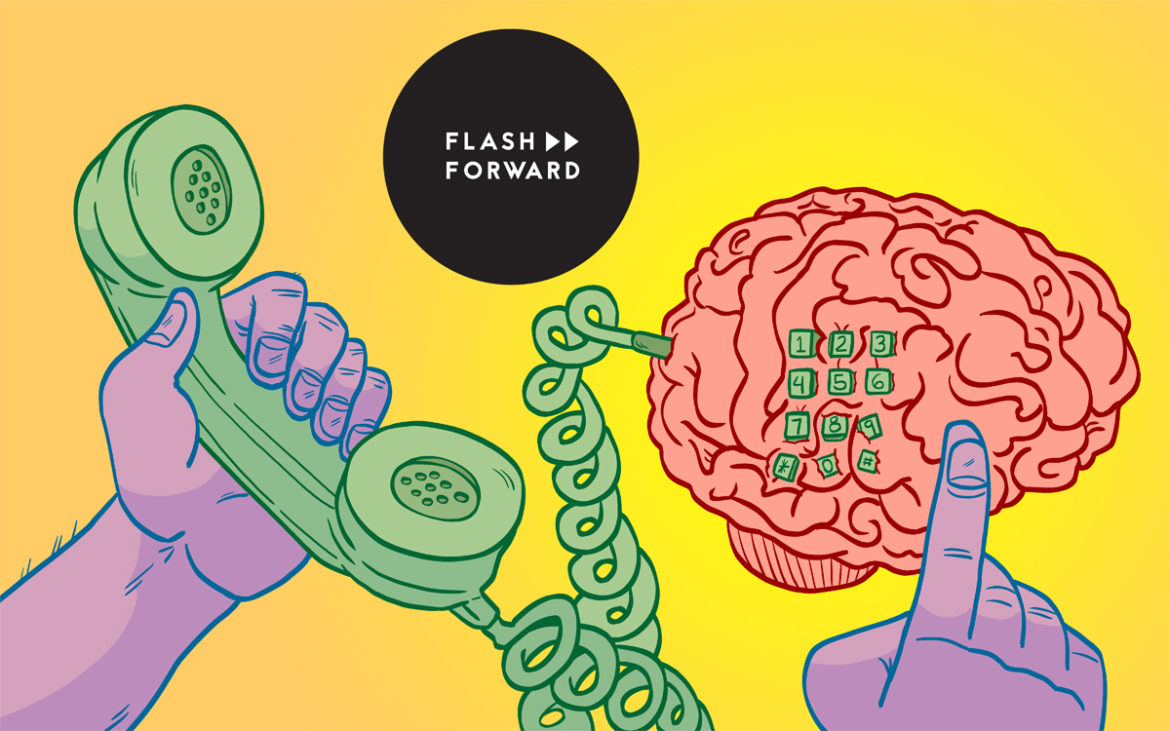
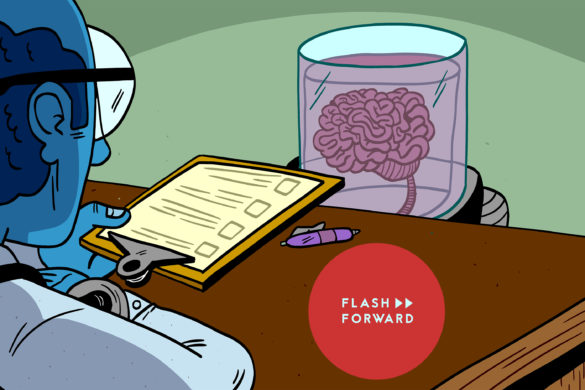
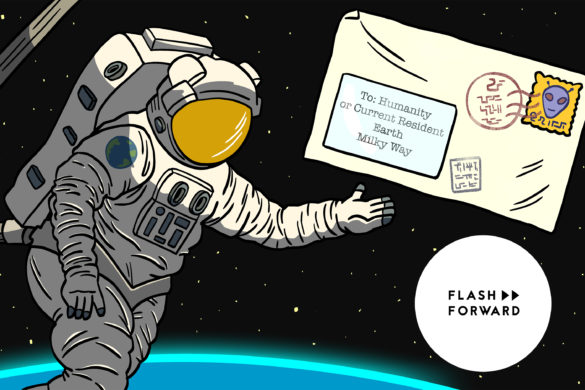
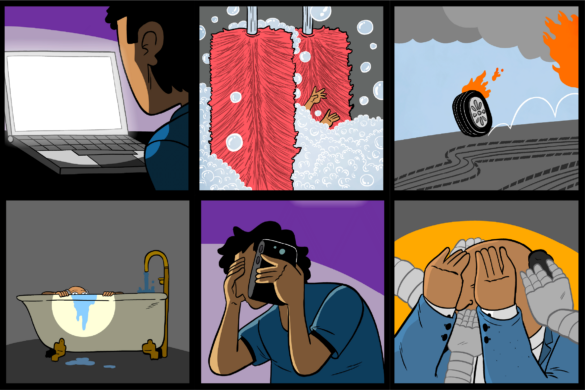
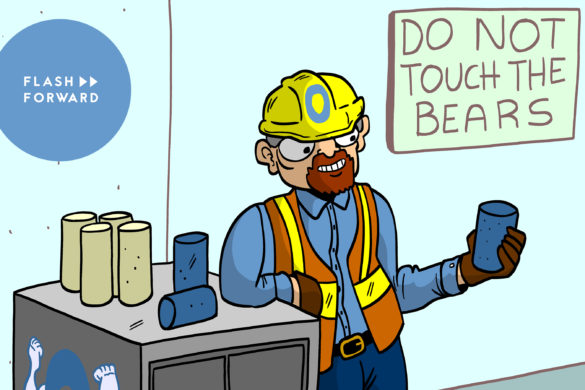

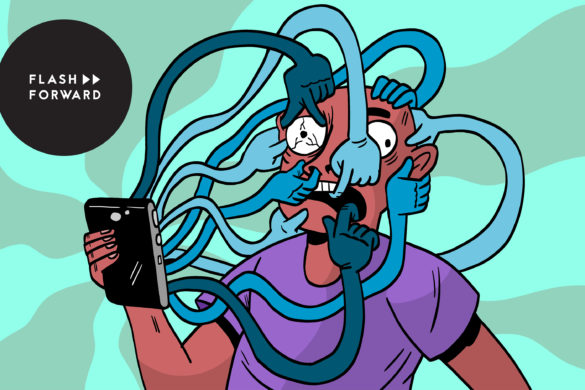

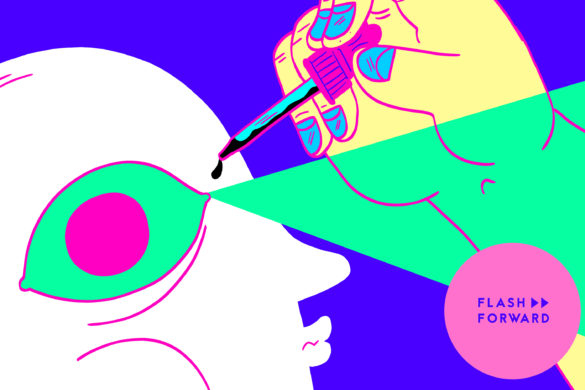
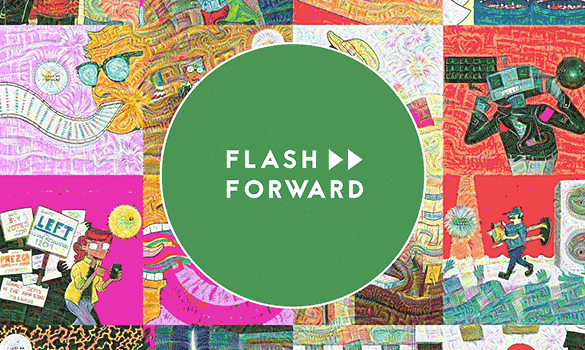
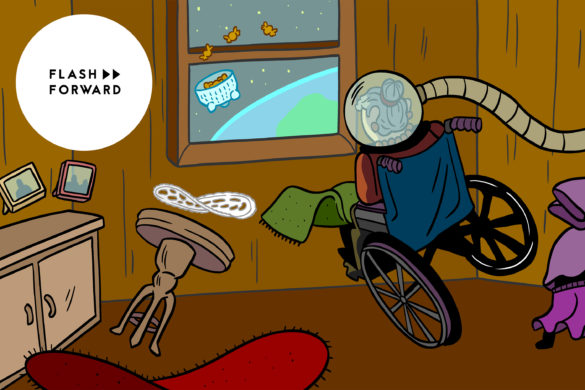
2 comments
[…] I KNOW WHAT YOU’RE THINKING. Rose Eveleth, in the podcast Flash Forward, has an episode called “You’ve Got Brainmail” where she interviews author Ramez Naam, sf scholar Roger Luckhurst, and the etiquette columnist of […]
[through the ether , [f]EATHER!]
aphoric reference means that a word in a text refers back to other ideas in the text for its meaning. It can be compared with cataphoric reference, which means a word refers to ideas later in the text.
Is it possible to encode something on a chip with electromagnetism?*.~Look! Already, you believe that no two fingerprints are exactly alike, past, prerant OR future. Why are our names for people not the same?
De3rived from DaAprRpaPaA.anyosats:-self assemble into little nanobots………………WHAT ‘BOUT NANOCASTING FAIRY DUST? How can I plug an N…sat into my soul, which is how this guy was able to get back to us!
TIME TRAVEL AVAILABLE TO THE PUBLIC IN 6000 AD
My recommendation for Rose is the Transcension Hypothesis: *.* John Smart
Northern Faces – Messin’ With Me
(Pretty good Podcast for integration with Ezra Klein.)
January 9, 2018>>>>>>>LOVE.BRAIN.MAIL!~.*
.
03/04/2018
244: PM